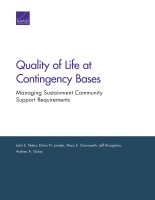| 来源类型 | Research Reports
|
| 规范类型 | 报告
|
| DOI | https://doi.org/10.7249/RR1298
|
| ISBN | 9781977401861
|
| 来源ID | RR-1298-A
|
| Quality of Life at Contingency Bases: Managing Sustainment Community Support Requirements |
| John E. Peters; Elvira N. Loredo; Mary E. Chenoweth; Jeff Broughton; Andrea A. Golay
|
| 发表日期 | 2018
|
| 出版年 | 2018
|
| 页码 | 128
|
| 语种 | 英语
|
| 结论 |
Policies Controlling Food, Water, and Fuel Consumption Are Key to Maintaining Quality of Life Under Logistical Constraints- Fresh food is one important part of soldier quality of life (QoL). The fresher the food, the greater its weight. A B-ration (meals prepared using canned or preserved ingredients) diet would require a 44-percent convoy premium over meals, ready to eat (MREs). An A-ration (meals prepared using fresh, refrigerated, or frozen foods) diet would require a 58-percent convoy premium over MREs.
- Showers and laundry are other important factors in soldier QoL. An estimated 75 percent of the water required at contingency bases is utilized for showers. Using just one shower water–reuse system at its full capacity can result in saving potentially 3.2 million gallons of water per year. The Army is investigating other opportunities, including gray-water recovery from laundry and food preparation and similar sources.
- Privacy and climate control are also important for QoL. Base-camp energy is an area rich in potential savings, both in terms of electricity and in terms of fuel. One potentially very effective fuel-saving option is the selection of soldier housing and work location structures. If 90 percent of the fuel consumed goes to living, dining, and office space provided in barrack (wooden) huts (B-huts), a switch to huts made from structural insulated panels (which demand just 60 percent as much energy as B-huts) would reduce energy demand by an estimated 42,000 gallons per month.
|
| 摘要 |
- Maximize the use of local water sources in support of base-camp operations.
- Continue to develop doctrine for base-camp wastewater recovery, treatment, and reuse.
- Update existing base-camp doctrine to institutionalize the lessons learned since the version published in 2013.
- Supplement existing documentation with doctrinal information and standards, forming a single base-camp development regulatory standard.
- Consider creating modified table of organization and equipment (MTOE) organizations to construct and administer contingency bases.
- Assign base-camp management responsibility to an MTOE organization for contingency bases with fewer than 6,000 residents.
- Institutionalize base-camp management training.
- Develop and institutionalize training and tools that enable combatant command and Army service component command planners to more effectively conduct base-camp life-cycle planning.
- Consider expanding the Advanced Medium Mobile Power Sources inventory as a replacement for other tactical generators currently in use.
- Continue to build capability for base-camp water management.
- Develop and implement materiel solutions to meet minimum energy-efficiency standards for temporary structures.
- Develop policies that constrain automatic expansion of base-camp facilities and services.
- Establish and widely promulgate standard levels of support for base-camp services and sustainment for each phase of the base-camp life cycle.
- Establish energy-efficiency requirements or incentives in base-camp energy support contracts.
- Eliminate or limit retail restaurants and thereby avoid the water penalty associated with meal preparation and cleanup.
- Relax the restrictions on military construction to enable energy-efficient semi-permanent and permanent base-camp construction.
- Develop and establish contingency basing management standard operating procedures to achieve minimum energy-efficiency standards for semi-permanent and permanent base-camp structures.
|
| 主题 | Combat Service Support
; Military Facilities
; United States Army
|
| URL | https://www.rand.org/pubs/research_reports/RR1298.html
|
| 来源智库 | RAND Corporation (United States)
|
| 引用统计 |
|
| 资源类型 | 智库出版物
|
| 条目标识符 | http://119.78.100.153/handle/2XGU8XDN/108913
|
推荐引用方式
GB/T 7714 |
John E. Peters,Elvira N. Loredo,Mary E. Chenoweth,et al. Quality of Life at Contingency Bases: Managing Sustainment Community Support Requirements. 2018.
|
|
文件名:
|
x1543505729583.jpg
|
|
格式:
|
JPEG
|

|
文件名:
|
RAND_RR1298.pdf
|
|
格式:
|
Adobe PDF
|
除非特别说明,本系统中所有内容都受版权保护,并保留所有权利。